- Home
- Gustave Aimard
The Queen of the Savannah: A Story of the Mexican War
The Queen of the Savannah: A Story of the Mexican War Read online
E-text prepared by Camille Bernard and Marc D'Hooghe(https://www.freeliterature.org) from page images generously made availableby the Bodleian Libraries, University of Oxford(https://www.bodleian.ox.ac.uk/bodley)
Note: Images of the original pages are available through the Bodleian Libraries, University of Oxford. See https://dbooks.bodleian.ox.ac.uk/books/PDFs/600062502.pdf
THE QUEEN OF THE SAVANNAH
A Story of the Mexican War
by
GUSTAVE AIMARD
Author of"Last of the Incas," "Red Track," "Prairie Flower," etc.
London:Ward and Lock, 158, Fleet Street.MDCCCLXII.
CONTENTS.
PROLOGUE.
I. THE EXPEDITION. II. REDSKINS AND WHITESKINS. III. THE RED BUFFALOES. IV. THE CASCABEL.
I. THE ADVENTURERS. II. A NIGHT IN THE WOODS. III. THE SUCCOUR. IV. INSIDE THE HACIENDA. V. THE COUNCIL. VI. GENERAL FRAY PELAGIO. VII. A CONVERSATION. VIII. THE ENVOY. IX. DON MELCHIOR DIAZ. X. MOTHER AND DAUGHTER. XI. THE SORTIE. XII. ON THE ROAD. XIII. AN ALARM. XIV. THE REDSKINS. XV. COUNT DE MELGOSA. XVI. DIEGO LOPEZ. XVII. LEONA VICARIO. XVIII. THE INTERVIEW. XIX. THE DUNGEON. XX. SOTAVENTO MAKES A MOVE. XXI. THE COUNCIL OF THE RED BUFFALOES. XXII. THE WAR TRAIL. XXIII. THE SNARE. XXIV. OLIVER CLARY. XXV. THE WOUNDED MAN. XXVI. DONA EMILIA. XXVII. THE CHIEF'S PROPOSAL. XXVIII. PREPARATIONS FOR A RESCUE. XXIX. THE REVOLUTION. XXX. ON THE TRAIL. XXXI. THE JACAL. XXXII. THE PRISONER. XXXIII. MOONSHINE. XXXIV. THE TEOCALI. XXXV. IN THE FIELD. XXXVI. A YOUNG HEART. XXXVII. THE AMBUSH. XXXVIII. THE PURSUIT. XXXIX. RUNNING WATER.
THE QUEEN OF THE SAVANNAH.
PROLOGUE
CHAPTER I.
THE EXPEDITION.
The story begins on May 5, 1805, in one of the wildest and most abruptportions of New Spain, which now forms the State of Coahuila, belongingto the Mexican Confederation.
If the reader will have the kindness to take a glance at a numerouscavalcade, which is debouching from a canyon and scaling at a gallopthe scarped side of a rather lofty hill, on the top of which stands an_aldea_, or village of Indios mansos, he will at the same time form theacquaintance of several of our principal characters, and the country inwhich the events recorded in this narrative occurred.
This cavalcade was composed of fifteen individuals in all; ten of themwere lancers, attired in that yellow uniform which procured them thenickname of _tamarindos_. These soldiers were execrated by the people,in consequence of their cruelty. They advanced in good order, commandedby a subaltern and an alferez--an old trooper who had grown gray inharness, who had long white moustachios and a disagreeable face. As hegalloped on, he looked around him with the careless, wearied air of aman for whom the future reserves no hopes either of ambition, love, orfortune.
About twenty paces from this little band, and just so far aheadthat their remarks reached the soldiers' ears in a completelyincomprehensible fashion, three persons, two men and a woman, wereriding side by side.
The first was a gentleman of about thirty years of age, of commandingstature; his harsh, haughty, and menacing features were rendered evenmore gloomy by a deep scar of a livid hue which commenced on his righttemple and divided his face into two nearly equal parts.
This man, who was dressed in the sumptuous costume of the Mexican_campesinos_, which he wore with far from common grace, was named DonAnibal de Saldibar, and was considered the richest hacendero in theprovince.
His companion, who kept slightly in the rear, doubtless throughrespect, was a civilized Indian, with a quick eye, aquiline nose, and awide mouth lined with two rows of dazzling white teeth. His countenanceindicated intelligence and bravery. He was short and robust, and thealmost disproportioned development of his muscles gave an enormouswidth to his limbs. This individual must assuredly be endowed withextraordinary strength. His attire, not nearly so rich as that of thehacendero, displayed a certain pretension to elegance, which was anextraordinary thing in an Indian.
This man's name was Pedro Sotavento, and he was majordomo to Don Anibal.
As we have said, the third person was a female. Although it was easy tosee, through the juvenile grace of her movements and her taper waist,that she was still very young, she was so discreetly hidden behindgauze and muslin veils, in order to protect her from the burning heatof the sun which was then at its zenith, that it was impossible todistinguish her features. Long black locks escaped from beneath herbroad-brimmed vicuna hat, and fell in profusion on her pink and whiteshoulders, which were scarcely veiled by a China crape _rebozo_.
At the moment when we approach these three persons they were conversingtogether with considerable animation.
"No," Don Anibal said, with a frown, as he smote the pommel of hissaddle, "it is not possible, I cannot believe in so much audacityon the part of these Indian brutes. You must have been deceived,Sotavento."
The majordomo grinned knowingly, and buried his head between hisshoulders with a motion which was habitual to him.
"You will see, _mi amo_," he replied, in a honeyed voice, "myinformation is positive."
"What!" the hacendero continued with increased fury, "They would reallyattempt resistance! Why, they must be mad!"
"Not so much as you suppose, mi amo; the aldea is large and contains atleast three thousand _callis_."
"What matter? Suppose there were twice as many, is not one Spaniard asgood as ten Indians?"
"In the open, perhaps so."
"What is that you say--perhaps?" Don Anibal exclaimed, turning sharplyround, and giving his majordomo a glance of supreme contempt. "Really,Sotavento, your Indian origin involuntarily abuses your judgment bymaking you regard things differently from what they really are."
"No, mi amo. The Indian origin with which you reproach me, on thecontrary, makes me judge the situation healthily; and, believe me, itis far more serious than you imagine."
These words were uttered in a serious tone, which caused the proudSpaniard to reflect.
Pedro Sotavento had been in his service for a long time. He knewthat he was brave and incapable of being intimidated by threats orrodomontade. Moreover, he had always been kind to him, and believedhimself sure of his devotion, hence he continued in a milder key--
"That is the reason, then, why you insisted so strongly on my taking anescort when we passed the Fort of Agua Verde?"
"Yes, mi amo," he replied, giving the soldiers a glance of singularexpression. "I should have liked it to be more numerous."
"Nonsense, had it not been through consideration for the senora, whomI am anxious not to terrify in her present condition, I would nothave accepted a single soldier. We alone are more than sufficient tochastise these scoundrels, were there a thousand of them."
"Don Anibal," the young lady here said in a soft and harmonious voice,"the contempt you profess for these poor people is unjust. Though theyare of a different colour from us, and almost devoid of intellect,they are men for all that, and as such have a claim on our pity."
"Very good, senora," the hacendero answered savagely; "take their partagainst me, that will not fail to produce an excellent effect."
"I take no person's part, Don Anibal," she continued, with a slighttremor in her voice. "I merely offer an opinion which I considercorrect, that is all. But your outbursts of passion terrify me; perhapsit would have been better to leave me at the hacienda, as I expressed adesire."
"My family are never insulted with impunity, senora; I wished yo
u towitness the vengeance which I intend taking for the insult offered toyou."
"I made no complaint to you, Don Anibal. The slight insult I received,even admitting that it was an insult, does not deserve so terriblea punishment as you purpose to inflict on these unhappy creatures.Take care, Don Anibal. These men whom, in your Castilian pride, youobstinately insist on ranking with the brute beasts and treating assuch, will grow weary one day. They already feel a profound hatred foryou. The Indians are vindictive, and may wait perhaps for twenty yearsthe opportunity to repay you the evil you have done them; but thentheir vengeance will be frightful."
"Enough, senora," the hacendero said roughly; "but while waiting forthis vengeance with which you menace me in their name, I mean to treatthem as they deserve."
The young lady bowed her head, and made no further remark.
"Oh!" the majordomo said, with a grin of mockery, "You can strikewithout fear, mi amo. The Indians have been too long accustomed tobend their necks for them ever to feel any desire to draw themselves upand bite the hand which chastises them."
These words were uttered with an accent which would have caused DonAnibal to reflect seriously, had he not been so infatuated about hisreal or supposed superiority over the unfortunate race that formed thesubject of the conversation we have just reported.
The opinion expressed by the hacendero was not so erroneous as it mightappear to a European. The Spanish name was at this period surroundedby such a prestige; the hapless Indians were reduced to such a stateof degrading servitude and brutalization; they seemed to have sothoroughly recognized the superiority of their oppressors, that thelatter did not even take the trouble to hide the contempt with whichthese degenerate remains of the powerful races they had vanquished informer times inspired them. They affected, under all circumstances, tomake them feel all the weight of the yoke under which they bowed them.
Still, under present circumstances, the proud Spaniard committed agrave error. For this reason:
The Indians against whom he was marching at this moment were notattached by any tie to those whom three centuries of slavery hadrendered submissive to the Spanish authority. They had only beensettled for about thirty years, through their own free will, at thespot where they now were. This requires an explanation, which we willproceed to give, begging the reader to pardon this digression, whichis indispensable for the comprehension of the facts which we haveundertaken to recount.
There are races which seem destined by fate to disappear from thesurface of the globe. The red race is of the number, for it has nofiercer enemy than itself.
The Indians, in lieu of making common cause against their oppressors,and trying to emancipate themselves from their tyranny, expend alltheir courage and energy in fratricidal contests of nation againstnation, tribe against tribe, and thus help those who do all in theirpower to keep them down. These contests are the more obstinate, becausethey take place between men of the same blood and even of the samefamily for originally frivolous causes, which, however, soon attainconsiderable importance, owing to the number of warriors who succumb tothe rage and ferocity displayed on both sides.
Hence entire nations, formerly powerful, are gradually reduced to a fewfamilies, and in a relatively short period become entirely extinct,the few surviving warriors seeking their safety in flight, or goingto claim the protection of another nation with which they soon becomeblended.
Hence we may account for the fact that the names of the tribesflourishing at the period of the discovery of America are now scarcelyknown, and it is impossible to recover any trace of them.
The first conquerors, impelled by religious fanaticism and anunextinguishable thirst for gold were, we allow, pitiless to theirunhappy victims, and sacrificed immense numbers in working the mines.Still, to be just, we must state that they never organized thosegrand Indian hunts which the Anglo-Saxons initiated in North America;they never offered a reward of fifty dollars for every Indian scalp;and instead of driving back the Indian race before them, they, onthe contrary, blended the native blood with their own, so that thenumber of Indians has been considerably augmented in the old Spanishpossessions, while they will ere long disappear in North America, wherethey are hunted down like wild beasts.
According to a census made by the Washington Congress in 1858, theIndians scattered over the territory of the United States amount to800,000.
In Mexico, where the population is only seven million, there are fivemillion Indians and half-breeds; moreover, it is proved that in thetime of Motecuhzoma the population never attained this high figure.
It results then from our remarks that the Spaniards who, during threecenturies, incessantly massacred the Indians, succeeded in increasingtheir numbers; while the North Americans who are so philosophical andsuch philanthropists have attained a diametrically opposite result, andduring the sixty years since they proclaimed their independence, inspite of all the efforts made to civilize the Indians, they have nearlyexterminated those tribes which dwell on their territory.
It must be confessed that this is a most unfortunate result! We willstop here, for every thinking man will be enabled to draw the solelogical conclusion from our remarks without our dilating on them.
About forty years before the period at which our story begins, two ofthe most important tribes of the Comanche nation suddenly quarrelledafter an expedition they had made in common against the Apaches, theirreconcilable enemies of the Comanches, with whom they alone dare todispute the supremacy on the great prairies of the Far West.
This expedition had been completely successful: a winter village of theApaches was surprised by night, the horses were carried off, and sixtyscalps raised.
The warriors returned to the gathering place of their nation, singing,dancing, and celebrating their exploits, as they are accustomed to dowhen, in an expedition of this nature, they have killed several oftheir enemies without any loss on their own side. This had been thecase on the present occasion. The Apache warriors, aroused from deepsleep, had fallen like ripe corn beneath the tomahawks of the Comanchesas they sought to escape from their burning lodges without thought ofarming themselves.
In spite of all the care taken in the division of the plunder thateach tribe might be equally favoured, the chiefs did not succeed insatisfying everybody; the warriors who thought themselves defraudedgave way to recriminations; tempers were heated, and, as alwayshappens with men who constantly go about armed, they proceeded almostimmediately from words to blows.
There was a battle; blood followed in streams, and then the two tribesseparated, swearing a deadly hatred, though it was impossible todiscover whence the quarrel originated, or which side was in the wrong.These two tribes were the "White Horse" and the "Red Buffalo."
Then a war began between these old friends which threatened to beindefinitely prolonged; but one day the Red Buffaloes, being surprisedby their enemies, were almost entirely exterminated, after a fight thatlasted two days, and in which even the squaws took part.
The vanquished, reduced to about fifty warriors and the same number ofwomen and children, sought safety in flight, but being hotly pursued,they were compelled to cross the Indian border, and seek a refuge uponSpanish territory.
Here they drew breath. The Spanish government allowed them to settlein the neighbourhood of the Fort of Agua Verde, and granted them theright of self-government, while recognizing the authority of the kingof Spain, and pledging themselves to be guilty of no exactions of anysort.
The Red Buffaloes, pleased with the protection granted them,religiously carried out the conditions of the treaty; they built avillage, became husbandmen, accepted the missionary sent to them,turned Christians, ostensibly at least, and lived on good termswith their white neighbours, among whom they speedily acquired thereputation of being quiet and honest people.
Unhappily, perfect happiness is not possible in this world, and thepoor Indians soon learnt this fact at their own expense.
The ground on which their wretched village stood was surrounded b
y thelands of the Hacienda del Barrio, which had belonged, ever since theconquest, to the Saldibar family.
So long as Don Jose de Saldibar was alive, with the exception of a fewinsignificant discussions, the Indians were tolerably at liberty; butwhen Don Anibal succeeded his father, matters at once altered.
Don Anibal signified to the chief cacique of the Red Buffaloes, that hemust allow himself to be a vassal, and consequently pay to him not onlya tithe of his crops, and the capitation tax, but also supply a certainnumber of his young men to work in the mines and guard the cattle.
The chief answered with a peremptory refusal, alleging that he was onlydependent on the Spanish government, and recognized no other sovereign.
Don Anibal would not allow himself to be defeated; he organized againstthe Indians a system of dull annoyance for the purpose of compellingthem to give way; he cut down their woods, sent his cattle to grass intheir fields, and so on.
The Indians suffered without complaining. They were attached to theirwretched huts and did not wish to quit them.
This patient resignation, this passive resistance, exasperatedDon Anibal. The Indians let themselves be ruined without utteringcomplaints or threats; several of their young men were carried off,and they did not offer the slightest protest. The hacendero resolvedto come to an end with these men whom nothing could compel to obey hiswill.
In spite of himself, he was terrified at the indifference of theIndians, which he fancied too great not to be affected; he went over inhis mind all he had made the poor people suffer, and the injustice hehad done them, and came to the conclusion that they were preparing totake some terrible vengeance on him.
He determined to be beforehand with them, but he needed a pretext, andthis Sotavento, his majordomo, undertook to provide him with.
This Sotavento, of whom we have already said a few words, was himselfof Indian race. One of Don Anibal's friends had warmly recommended him,and for twelve years he had been in the service of the hacendero, whosegood and bad passions he had contrived so cleverly to flatter, withthat suppleness of character natural to the redskins, that the latterplaced the most perfect confidence in him.
Sotavento, naturally, carried out his master's orders zealously, andeagerly seized every opportunity to injure the Red Buffaloes, for whomhe appeared to entertain a profound hatred.
After consulting with his master, Sotavento managed matters so thatone day Dona Emilia, Don Anibal's wife, who had hitherto defendedthe poor people of the aldea under all circumstances, and had evensucceeded in saving them from several vexatious acts, was, while takinga walk, insulted by an Indian, or at least a man wearing their costume,and was so frightened that she was confined to her bed for several days.
The hacendero made the more noise about this insult, because, as hiswife was _enceinte_, the fright she had undergone might have had veryserious consequences for her.
He proceeded in all haste to the capital of the province, had a longinterview with the governor, and then returned home, certain this timeof gaining the end at which he had so long aimed.
He had been accompanied from the city by a juez de letras, aninsignificant person, to whom we have not yet alluded, and who appearedbut little pleased with the duty confided to him, for he trottedtimidly along upon a scrubby mule behind the soldiers.
Only stopping at the hacienda long enough to bid his wife mounther horse and come and see what was going to happen, Don Anibal atonce continued his journey, consenting with great difficulty, uponthe repeated entreaties of his majordomo, to accept the escort thecommandant of the Fort of Agua Verde offered him, for he was so eagerto revenge himself.
The country the travellers passed through was extremely picturesque;from the elevation they had reached, they surveyed an admirablelandscape closed in on the horizon by lofty forest-clad mountains.In the west spread out the immense sheet of water, known as the AguaVerde, which the beams of the setting sun tinged with all the prismatichues. Besides this, they could see the Rio Grande, which was lost ininfinite windings, the Fort of the Bahia, situated on a point of theriver, and the green prairies of the Indian border, which were agitatedby mysterious movements.
In the meanwhile the Mexicans continued to ascend, we dare not say theroad, for no roads of any sort existed at that period in this savagecountry, and we doubt whether any exist now, but the track which led tothe aldea of the Red Buffaloes.
This track, cut by human hands on the sides of the hill round which itwound, became more and more scarped, and at last resembled a staircase,which would have mightily staggered a European traveller, but thesehorsemen did not even seem to notice the fact.
All at once, Sotavento, who had pushed on slightly ahead during theconversation between the hacendero and Dona Emilia, uttered a cryof surprise as he stopped his horse so short, that the noble animaltrembled on its hind legs.
"What is the matter?" Don Anibal asked as he spurred his horse.
"Look there!" the majordomo replied, stretching his hand.
"_iMil demonios!_" Don Anibal shouted passionately, "What is themeaning of this? Who has warned the scoundrels?"
"_?Quien sabe?_" the majordomo said with a grin.
Several trees, to which the branches and roots were still attached, hadbeen thrown across the track, and formed a barricade about ten feet inheight, which completely stopped the way.
The travellers were compelled to halt before this impassable obstacle.
The hacendero was startled for a moment, but soon, shaking his headlike a lion at bay, he looked around defiantly, dismounted, and drawinghis machete, walked boldly up to the barricade, while Sotavento,motionless and with folded arms, looked cunningly at him.
The lancers, whom this compulsory stoppage had enabled to catch up thefirst party, cocked their carbines at an order from their commandingofficer, and held themselves in readiness to fire at the first signal.

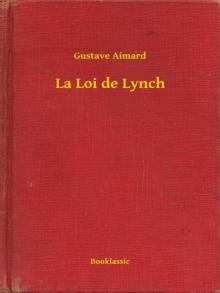 La loi de lynch. English
La loi de lynch. English The Guide of the Desert
The Guide of the Desert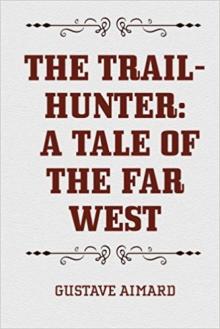 The Trail-Hunter: A Tale of the Far West
The Trail-Hunter: A Tale of the Far West The Pirates of the Prairies: Adventures in the American Desert
The Pirates of the Prairies: Adventures in the American Desert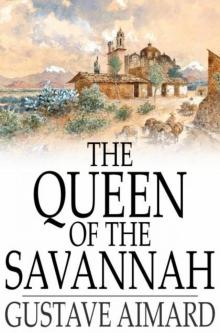 The Treasure of Pearls: A Romance of Adventures in California
The Treasure of Pearls: A Romance of Adventures in California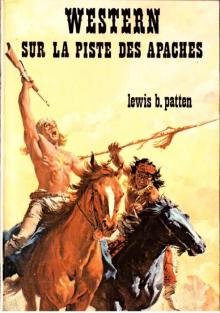 Les outlaws du Missouri. English
Les outlaws du Missouri. English Les trappeurs de l'Arkansas. English
Les trappeurs de l'Arkansas. English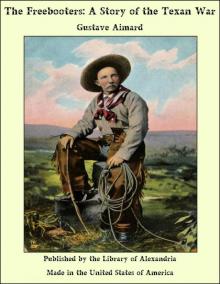 The Border Rifles: A Tale of the Texan War
The Border Rifles: A Tale of the Texan War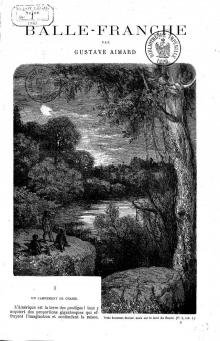 Balle-Franche. English
Balle-Franche. English The Queen of the Savannah: A Story of the Mexican War
The Queen of the Savannah: A Story of the Mexican War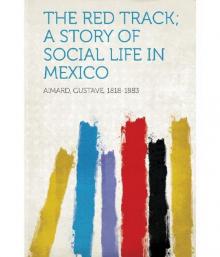 The Red Track: A Story of Social Life in Mexico
The Red Track: A Story of Social Life in Mexico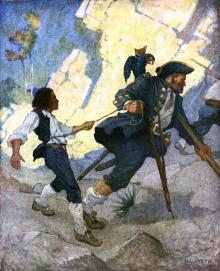 La fièvre d'or. English
La fièvre d'or. English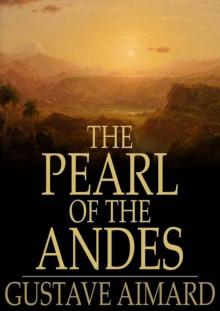 The Pearl of the Andes: A Tale of Love and Adventure
The Pearl of the Andes: A Tale of Love and Adventure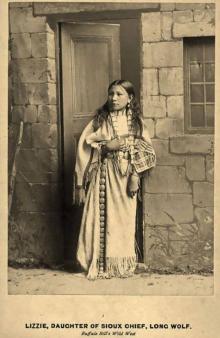 Les fils de la tortue. English
Les fils de la tortue. English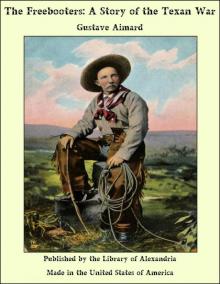 The Indian Chief: The Story of a Revolution
The Indian Chief: The Story of a Revolution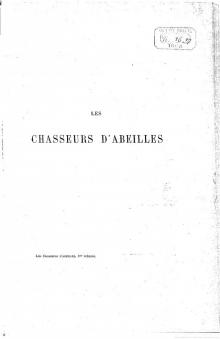 Les chasseurs d'abeilles. English
Les chasseurs d'abeilles. English The Adventurers
The Adventurers